|
|
|
Sort Order |
|
|
|
Items / Page
|
|
|
|
|
|
|
| Srl | Item |
| 1 |
ID:
158557
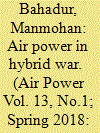

|
|
|
| 2 |
ID:
111153
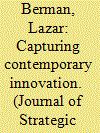

|
|
|
|
|
| Publication |
2012.
|
| Summary/Abstract |
The question of what enables some militaries to innovate effectively is of great interest to both scholars and commanders. However, the traditional models of military innovation fail to capture the complex innovation process. This study develops a new analytical framework that examines the pressures on and incentives for military innovation in the international, civil/military, organizational, and cultural planes and uses it to evaluate Israel Defense Forces (IDF) innovation between 2000 and 2009. Based on interviews with Israeli commanders and extensive research in Israel, this work finds that the IDF struggled to innovate before the 2006 war against Hizballah, but innovated effectively after the conflict once military and civilian leaders understood threats similarly. New models are needed to analyze the contemporary multi-dimensional innovative process.
|
|
|
|
|
|
|
|
|
|
|
|
|
|
|
|
| 3 |
ID:
126294
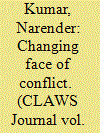

|
|
|
| 4 |
ID:
165333
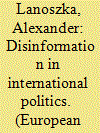

|
|
|
|
|
| Summary/Abstract |
Concerns over disinformation have intensified in recent years. Policymakers, pundits, and observers worry that countries like Russia are spreading false narratives and disseminating rumours in order to shape international opinion and, by extension, government policies to their liking. Despite the importance of this topic, mainstream theories in International Relations offer contradictory guidance on how to think about disinformation. I argue that disinformation is ineffective in terms of changing the policies of a target as regards to its foreign policy alignments and armaments – that is, the balance of power. To be strategically effective, disinformation must somehow overcome three powerful obstacles: first, the fundamental uncertainty that international anarchy generates over any information broadcasted by adversaries; second, the pre-existing prejudices of foreign policy elites and ordinary citizens; and third, the countermeasures that are available even amid political polarisation. I examine the most likely case of there seemingly being a conscious and effective strategy that emphasises disinformation: the Russian campaign that has targeted the Baltic states, especially since the 2014 annexation of Crimea. The available evidence strongly suggests that the strategic effects of disinformation are exaggerated.
|
|
|
|
|
|
|
|
|
|
|
|
|
|
|
|
| 5 |
ID:
153888


|
|
|
|
|
| Summary/Abstract |
This article examines the potential use of autonomous aerial weapons for targeted killing purposes and, in doing so, looks beyond the now-familiar “global war on terror.” We argue that the combination of novel capabilities with the pre-existing military-theoretical frameworks of advanced Western states, within which autonomous weapons will be embedded, may be conducive to an expansion of targeted killings to scenarios other than military counter-terrorism. The confluence of autonomous weapons and targeted killing practices may therefore lead to a further weakening of long-standing norms regulating the use of force, including in interstate scenarios. We also find that international regulation is unlikely to forestall this outcome, and that political-military insistence on centralized operational control may mitigate—but not negate—the disruptive potential of these developments. As a result, the possible consequences for the international order of an evolution of targeted killing practices along these lines should not be underestimated.
|
|
|
|
|
|
|
|
|
|
|
|
|
|
|
|
| 6 |
ID:
138948
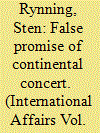

|
|
|
|
|
| Summary/Abstract |
The war in Ukraine is revelatory of a malaise in Europe's security order created by Russia's resistance to western institutions on the one hand and the western desire to maintain these institutions while partnering with Russia on the other. Absent a sense of priorities, western policy risks contributing to the erosion of Europe's security order that Russia seeks in opposition to western ambition. Europe's order is premised first and foremost on a distinctively western concert of nations—whereby Euro-Atlantic states coordinate policy according to a common purpose layered into both NATO and the EU—that forms part of a wider balance of power between Russia and the West. Western policy should aim to strengthen the concert and clarify the balance. However, the prevalent desire to include Russia in the concert confuses matters in a major way, eroding both the underlying sense of priorities and the foundation for order. This article examines this threatening erosion and traces it to three underlying trends: political contestation with regard to the meaning of ‘restoration’ post-1989; military instability following from the unpredictability of ‘hybrid war’; and moral equivocation on the part of the West when it comes to defending the Euro-Atlantic security order. The article concludes that given the depth of contestation, western allies should learn to distinguish concert from balance and act on the condition that the former, a vibrant western concert, is a precondition for the latter, a manageable continental balance.
|
|
|
|
|
|
|
|
|
|
|
|
|
|
|
|
| 7 |
ID:
178530
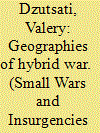

|
|
|
|
|
| Summary/Abstract |
What explains the variation in violence in the internationalized civil conflict? This study identifies such conflict as an adaptation of insurgency warfare by the state. The analysis of the conflict in Eastern Ukraine indicates that violence levels peak in the areas where the preexisting political loyalties for the challenger state were strongest, where the central government of the incumbent state has inadequate access, and where the impact of war on civilians is relatively low. The study also points to the importance of scaling factors for determining the intensity of violence.
|
|
|
|
|
|
|
|
|
|
|
|
|
|
|
|
| 8 |
ID:
178551
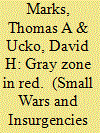

|
|
|
|
|
| Summary/Abstract |
With the United States having shifted its defense emphasis to peer and near-peer rivals, study of irregular warfare has likewise expanded its scope to applicable lessons for the strategic level, within the context of great-power competition. In theory, meanwhile, concern for sub-state actors remains an integral mission for the Department of Defense (DoD), with formal tasking issued to integrate into joint professional military education (JPME) the insights drawn from the last two decades of commitment. The resulting synthesis has led to a discussion of what has variously been termed gray zone conflict, hybrid war, or political warfare.
|
|
|
|
|
|
|
|
|
|
|
|
|
|
|
|
| 9 |
ID:
134444
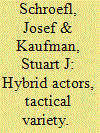

|
|
|
|
|
| Summary/Abstract |
Wars like those in Iraq and Afghanistan should be understood as hybrid wars, wars in which elements of ethnic or tribal conflict, ideologically based insurgency, factional squabbling, and organized crime are inextricably intertwined, with the same actors playing multiple and partially conflicting roles. Hybrid war is inherently transnational, featuring transnational crime networks, “migrant warriors,” transnational diaspora links, legitimate international trade, and foreign intervention. It takes place in hybridized states reliant on local warlords and other actors whose power prevents effective state-building. In this context, while counterinsurgency doctrine prescribes appropriate military strategy and tactics, the core problem is more political than military. Since a hybridized client state is not likely to be politically reformable even if a foreign ally achieves military success, outside allies like the United States should generally refrain from boots-on-the-ground intervention, pursuing instead a diplomatic solution, even though such a deal is likely to be unpalatable.
|
|
|
|
|
|
|
|
|
|
|
|
|
|
|
|
| 10 |
ID:
167712
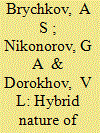

|
|
|
|
|
| Summary/Abstract |
Based on analysis of the military-political situation throughout the world, the US National Security Strategy and US military planning documents, the authors forecast some characteristics of the future wars and armed conflicts. These factors relate to the proliferation of asymmetric and indirect actions, the shift of armed confrontation to cities and populated centers, and the broader application of irregular formations.
|
|
|
|
|
|
|
|
|
|
|
|
|
|
|
|
| 11 |
ID:
096586
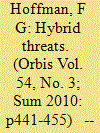

|
|
|
|
|
| Publication |
2010.
|
| Summary/Abstract |
Hybrid threats have now joined a growing suite of alternative concepts about the ever evolving character of modern conflict. Here and abroad, the hybrid threat construct has found traction in official policy circles despite its relative novelty. It has been cited by the U.S. Secretary of Defense in articles and speeches, and by policymakers now serving in the Pentagon. Heretofore, the rapidly growing hybrid threat literature has focused on the land warfare aspects of the threat. Modern hybrid threats, including Hezbollah and Iran, have demonstrated the ability to employ irregular tactics and advanced naval capabilities along with illegal or terrorist activity. Thus, the hybrid threat is applicable to naval forces and the U.S. Navy needs to dust off lessons learned from its last experience in the Persian Gulf in the late 1980s to better prepare for an even more challenging future.
|
|
|
|
|
|
|
|
|
|
|
|
|
|
|
|
| 12 |
ID:
172936
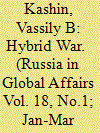

|
|
|
|
|
| Summary/Abstract |
The West firmly linked the concept of ‘hybrid war’ to Russia after it had
reincorporated Crimea. This happened largely due to the myth that
Russia had a special strategy of confrontation known as the “Gerasimov
Doctrine.” Its existence has already been denied by the authors of the
myth themselves. But the “Gerasimov Doctrine” story is quite indicative:
a similar U.S. hybrid war strategy was passed off as the Russian one. The
main features of this strategy have been studied by the Russian military and
politicians through the lens of “color revolutions” of the 2000s and the Arab
Spring of the early 2010s.
|
|
|
|
|
|
|
|
|
|
|
|
|
|
|
|
| 13 |
ID:
159294
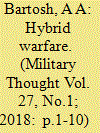

|
|
|
|
|
| Summary/Abstract |
The paper looks at the factors of war "friction" and "wear and tear" that affect prognostication, planning, and conduct of hybrid warfare in conditions of globalization and IT revolution.
|
|
|
|
|
|
|
|
|
|
|
|
|
|
|
|
| 14 |
ID:
193170
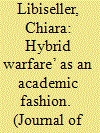

|
|
|
|
|
| Summary/Abstract |
The ‘hybrid warfare’ concept had been coined years earlier, but became fashionable only when it was adopted and adapted by NATO in 2014, after which academic interest suddenly sky-rocketed. Academics often adopted NATO’s understanding of the concept, took for granted its fit for Russian actions, and imported its political assumptions into the academic debate. The fashionability of the term also led to bandwagoning and thus superficial engagement with both the concept and the phenomenon it was applied to. This article outlines this process and its implications for the field of Strategic Studies.
|
|
|
|
|
|
|
|
|
|
|
|
|
|
|
|
| 15 |
ID:
192611
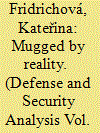

|
|
|
|
|
| Summary/Abstract |
This article discusses the surprising lack of preparedness in Russian propaganda preceding the invasion of Ukraine on February 24, 2022. Despite previous successes in developing strategic narratives during the annexation of Crimea, Russia underestimated the need for unique communication strategies for the conflict in Ukraine. The article argues that Russia's miscalculation was due to the assumption that it already had a set of strategic narratives in place, from the international order to specific issues, and viewed the conflict as a continuation of the story it had already told. However, increased scrutiny from Western media and academia led to a reexamination of assumptions and attitudes towards the region. Instead of Russia adapting its strategic narrative for a Western audience, it fell back on the existing one, further alienating the audience. This chapter highlights the importance of strategic narrative in international conflicts and its complex relationship with audience perception.
|
|
|
|
|
|
|
|
|
|
|
|
|
|
|
|
| 16 |
ID:
179097
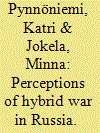

|
|
|
|
|
| Summary/Abstract |
In this article, we analyse what hybrid war entails in the context of Russian military periodicals. Two dominant interpretations emerge from the debate. Hybrid war involves a conflict between civilizations and a geopolitical struggle for power. In both cases, the West is represented as an active participant in the conflict, intent upon undermining Russia’s geopolitical status, cultural code and political system. The debate emulates Russian official rhetoric about national security threats and thus consolidates official interpretations, rather than offers alternatives to them. Russian analysts have also engaged in more abstract theoretical analysis in which hybrid terminology is rarely used or is approached critically. Further research is required to assess the ways in which this debate has been used in shaping public perceptions of threats towards Russia.
|
|
|
|
|
|
|
|
|
|
|
|
|
|
|
|
| 17 |
ID:
178553
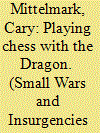

|
|
|
|
|
| Summary/Abstract |
Having engaged in some two decades of irregular war, the United States now finds itself confronted by a resurgent China, determined to utilize asymmetric approaches to both strengthen its grip on power at home and reshape the international environment in its favor. Despite the parameters of Beijing’s strategy having been clearly laid out, Washington has failed to respond in coherent fashion. This reality should be altered by constructing a revitalized approach upon the foundation already put in place through the country’s long, extensive experience in irregular warfare.
|
|
|
|
|
|
|
|
|
|
|
|
|
|
|
|
| 18 |
ID:
178808
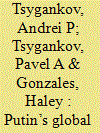

|
|
|
|
|
| Summary/Abstract |
Despite the reputation of being objective and non-partisan, experts
frequently validate concepts and ideas popular within the dominant elite
circles. To support this argument, we have taken a closer look into the
Atlantic Council (AC), an American think tank with clear preferences for the
U.S.-centered international order and NATO as the foundation of security in
Europe. We argue that these preferences have translated into anti-Russian
bias in AC publications. This is evident in the organization’s reliance on
the concept of global hybrid war in describing goals and means of Russian
foreign policy since 2014. We base our analysis on a sample of articles on
Russia and “hybrid war” published by the AC’s experts between 2014 and
2020. In establishing the AC’s pro-NATO and anti-Russian biases, we analyze
the articles’ frames as well as the political and institutional preferences held
by the organization.
|
|
|
|
|
|
|
|
|
|
|
|
|
|
|
|
| 19 |
ID:
140524
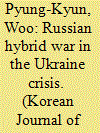

|
|
|
|
|
| Summary/Abstract |
This paper examines some characteristics of the Russian hybrid war in the Ukraine crisis since 2014, and then explores its implications. The hybrid approach is designed to generate “plausible deniability,” allowing Putin maximal tactical flexibility while avoiding responsibility. Russia’s hybrid warfare can be traced with some devices: propaganda (including cyber attack), tactics, the militants, and weapons. The meaning of the Russian hybrid war in Ukraine is focused on the three points. Firstly, Russia’s new approach, “hybrid war” cannot be considered independent of a long professional experience of Putin’s KGB operations before becoming a politician. Secondly, hybrid type warfare in Ukraine is not the first time for Russia. Putin previously applied his new kind of war almost unnoticed to the small and remote Georgia and Transnistria, but it cannot go without being understood when applied on a scale as large and visible as Ukraine. Thirdly, Russia’s actions in Ukraine have exploded the notion that expansive communications technologies and economic interdependence were fostering a kind of grand bargain. The Ukraine crisis suggests that world history after the Cold War is at an inflection point. In a world of hybrid warfare or non-linear conflict, we need to find new forms of deterrence
|
|
|
|
|
|
|
|
|
|
|
|
|
|
|
|
| 20 |
ID:
188370
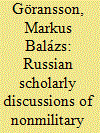

|
|
|
|
|
| Summary/Abstract |
The article examines Russian scholarly discussion of nonmilitary warfare with reference to securitization theory. Focusing on three main concepts of nonmilitary warfare that have featured in the Russian scholarly military and security debate in recent years – information war, color revolutions and hybrid war – it shows that Russian scholarly discussion of nonmilitary warfare, as it has evolved over time, has cast a widening range of phenomena as potential security threats, implying the need for an expanded state response to meet these threats. The broadened Russian understanding of security has some parallels in Western security discussions. However, a crucial distinction is that the Russian discussion has remained wedded to strong statist notion of security and a preponderant Western enemy image.
|
|
|
|
|
|
|
|
|
|
|
|
|
|
|
|
|
|
|
|
|